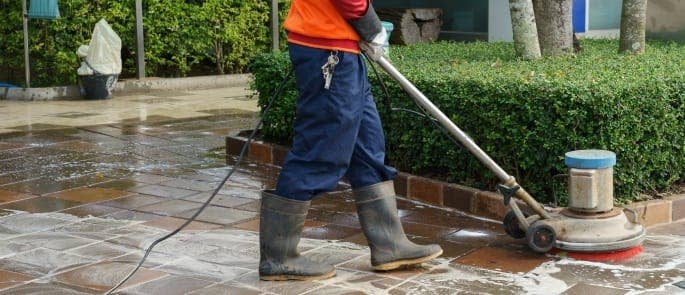Chapter 2: What Type of Cleaning Business Should I Start?
10 Traits of Cleaning Business Owners
First of all, you need to truly assess whether or not you have the right personal characteristics to start a cleaning business.
Whilst anyone with enough drive can start their own cleaning business, there are certain attributes and skills which, if you possess, will give you an advantage over competitors. You don’t need to have qualifications in cleaning but it does help if you can demonstrate the following:
- Perfectionism – cleaning is well-suited to those with an eye for detail and who won’t rest until a job is done ‘just so’.
- A love for organisation – if you love tidying, organising and re-arranging then cleaning will be a satisfying outlet.
- Stamina – cleaning involves tough, physical work so it’s important that you’re fit and able to keep up the pace.
- Lone working – to start with you may be the only person in your company and you’re likely to be cleaning whilst clients are out. A love for solitude can be beneficial.
- Not easily bored – some tasks may be repetitive or un-stimulating for the mind so mental stamina is just as important as physical.
- Trustworthiness – if you’re spending periods of time in someone’s home or office then they must be able to trust you with their possessions and house keys.
- Likability and friendliness – if you’re unpleasant or brash with your clients then they’re unlikely to recommend you or come back for repeat business.
- Administration skills – being self-employed means that a large part of your role will involve sorting out tax, wages and invoices etc so being good with papers and figures is essential.
- Time-keeping – nobody likes to be left waiting – and it also looks unprofessional – so being able to keep track of appointments is vital.
- Creativity – this will help you to advertise your business. Unique marketing ideas are much more memorable and will help you to get your brand out there.

What Type of Cleaning Business Should I Start?
Before you can begin to stock up on soap and pick up the polish, your first important decision is to decide what kind of cleaning company you actually want to start. There are 3 main areas that you may want to consider:
Domestic cleaning – this involves cleaning people’s homes and is usually done whilst the client is out of the house. You can work solo or hire a few employees to help you but the jobs are likely to be small and manageable. You might want to specialise in kitchens and bathrooms, focus on vacuuming and dusting or offer other services, such as washing and ironing. The start-up costs for a domestic cleaning business are low and you can often choose whether you use your own products or ask the client to supply them.
Commercial cleaning – this involves cleaning business premises, such as offices and shops, usually outside of working hours when the premises is closed. You’re more likely to need a team to tackle commercial cleaning tasks as the premises can be a lot larger than your average home. Your role in this sort of business could be more managerial and the start-up costs higher if you need to buy specialist cleaning equipment or transport.
Specialised cleaning – this can involve a range of different cleaning tasks depending on what you choose to be your speciality. For example, you may choose to focus on window cleaning, carpeting cleaning, graffiti removal or cleaning cars. The start-up costs for a specialised cleaning company can vary but it’s likely that you’ll need to buy specific cleaning equipment and products. You’ll also need to consider whether you can do the cleaning by hand or if you’ll require machinery.
Tidying or Cleaning?
Whilst pretty straightforward, this is a question you need to think about very carefully before starting your cleaning company, particularly for domestic and commercial businesses.
Consider this: when you offer to clean a client’s kitchen or office, have you offered to wipe the surfaces and mop the floor? Or have you offered to wash the dishes and tidy away the papers before you wipe the surfaces and mop the floor?
It may not seem like a big deal to have to tidy up someone’s coffee table before you can clean it, but tasks like these can quickly add up and contribute towards lost production time. When you determine your services it’s therefore important to clarify exactly what you do, and don’t, want to include in the price.
For example, imagine turning up for a 2-hour cleaning slot to find that you need to spend half of it tidying away children’s toys. You’ll have to stay an extra hour, or come back another day, to make sure you get your actual cleaning tasks completed. Either that or you can only complete half the job and will have to let your client know why!
Remember what tasks the client specifically requested, and make sure to ascertain this information from the onset; the last thing you want to do is play a guessing game and end up tidying away some important papers when the client only wants their children’s bedrooms cleaned!

Tips for Doing Market Research of Your Local Area
Market research is an essential first step of starting a business as, without it, you may find yourself diving straight in at the deep end struggling to stay afloat due to lack of demand for your business.
You can never assume that you already know everything about your target market – how do you know what they’re looking for or how much they’re willing to pay you? Market research will help you to answer these important questions and prevent you from making costly mistakes.
But where do you start? First of all get yourself amongst your customers. Knock on doors and call around your local area and actually speak to the people who you hope will become your clients. A warm smile and a friendly approach can work wonders and you’ll be surprised at how many people are willing to talk to you. Remember to ask key questions such as:
- Would you be interested in paying someone to do your cleaning?
- Which tasks would you like help with?
- How much would you be willing to pay for the service?
- Would you prefer a flat hourly rate or a variety of prices dependent on the task?
- At what time of day would the service be most beneficial to you?
- Would you prefer to supply your own cleaning products or have us bring them?
- Is there anything you wouldn’t want a cleaning company to do?
- Is there a cleaning service you wish a company offered, but currently doesn’t?
By asking everyone the same set of questions you’ll be able to collate the results and find out which choices are the most popular in your area. You’ll also be able to identify any potential gaps in the market where you may be able to thrive.
For example, have several people identified that they’d love someone to vacuum their hallway and stairs? Perhaps people have suggested a need for a more environmentally friendly cleaning service, or maybe several people have stated that they’re looking for a company offering better value for money.
Another market research method is to take a look at your competition. Have a look online, in the phone directory and local business guides, or simply ask around and find out if there are other cleaning companies operating in your area. You’ll need to consider:
- Which cleaning services are already on offer?
- Are there any services which aren’t offered locally?
- What prices do other companies charge?
- Which companies are the most popular and why?
- What methods of advertising do they use?
- Do they have any unique selling points (USPs)?
You can then use this information to see how your own cleaning company will fit into the picture. For example, are you entering a specific area of the market which a number of other similar companies already inhabit? What’s your USP? Are you competitive on pricing? And do you offer services that the other companies don’t?
Who’s Your Target Market?
This is another important question to answer as it’ll help you to determine what type of cleaning business you want to start and what kind of questions you should ask customers during your market research phase. Think about whether you want to focus on:
- Cleaning for individual clients in their houses.
- Cleaning empty rental properties on behalf of a landlord or letting agency.
- Cleaning offices.
- Cleaning schools etc.
The type of individuals and/or establishments that you target can drastically affect your business. For example, will you be cleaning everyday family homes or will you be cleaning luxury apartments? Are your clients hiring you as a service within their own business, like office managers and landlords? Does your target market value ‘green’ cleaning, high-end cleaning products or value for money the most?











